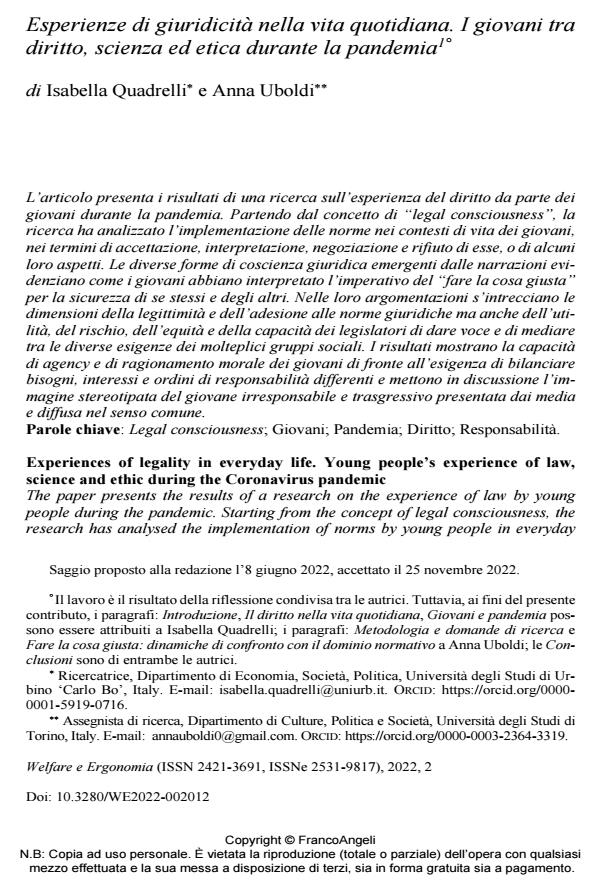Experiences of legality in everyday life. Young people’s experience of law, science and ethic during the Coronavirus pandemic
Journal title WELFARE E ERGONOMIA
Author/s Isabella Quadrelli, Anna Uboldi
Publishing Year 2023 Issue 2022/2
Language Italian Pages 16 P. 153-168 File size 208 KB
DOI 10.3280/WE2022-002012
DOI is like a bar code for intellectual property: to have more infomation
click here
Below, you can see the article first page
If you want to buy this article in PDF format, you can do it, following the instructions to buy download credits

FrancoAngeli is member of Publishers International Linking Association, Inc (PILA), a not-for-profit association which run the CrossRef service enabling links to and from online scholarly content.
The paper presents the results of a research on the experience of law by young people during the pandemic. Starting from the concept of legal consciousness, the research has analysed the implementation of norms by young people in everyday life, resulting in acceptance, interpretation, negotiation and refusal of them or of some parts of them. The different forms of legal consciousness emerging from narratives show how young people have interpreted the imperative of "doing the right thing" for themselves and for the wellbeing of others. Their motivation shows how the acceptance of legal rules is intertwined with considerations about utility, risk, equity and legislators’ capacity to give voice and to mediate among the needs of different social groups. Results show that young people are active, moral social actors, who consider and balance different needs, interests and responsibilities. Such evidence challenges stereotypical images of young people, presented by media and common sense, as irresponsible and transgressive.
Keywords: Legal consciousness; Young people; Pandemic; Law; Responsibility.
- Bourdieu P. (1992). Risposte. Per un’antropologia riflessiva. Torino: Bollati Boringhieri.
- Cardano M. e Ortalda F. (2021). L’analisi qualitativa. Novara: Utet.
- Chua L.J. and Engel D.M. (2019). Legal Consciousness Reconsidered. Annual Review of Law and Social Science, 15: 335-353.
- Cohen S. (1972). Folk devils and moral panics. London: Routledge. (trad. it: Demoni popolari e panico morale. Milano: Mimesis, 2019).
- Cook J., Threadgold S., Farrugia D. and Coffey J. (2021). Youth, Precarious Work and the Pandemic. Young, 29: 331-348. DOI: 10.1177/11033088211018964
- Engel D. (1998). How Does Law Matter in the Constitution of Legal Consciousness? In: Garth B.G. and Sarat A., editors, How Does Law Matter?. Evanston: Northwestern University Press.
- Ewick P. and Silbey S.S. (1998). The common place of law. Stories from everyday life. Chicago: The University of Chicago Press.
- Fristvold E.D. (2009). Under the Law: Legal Consciousness and Radical Environmental Activism. Law & Social Inquiry, 34: 799-824.
- Giddens A. (1984). The constitution of society. Outline of the theory of structuration. Berkeley & Los Angeles: University of California Press (trad. it.: La costituzione della società. Torino: Einaudi, 1990).
- Halliday S. (2019). After Hegemony: The Varieties of Legal Consciousness Research. Social & Legal Studies, 28(6): 859-878. DOI: 10.1177/0964663919869739
- Hertogh M. (2018). Nobody’s law. Legal consciousness and legal alienation in everyday life. London: Palgrave MacMillan.
- Hertogh M. and Kurkchiyan M. (2016). “When politics comes into play, law is no longer law”: Images of collective legal consciousness in the UK, Poland and Bulgaria. International Journal of Law in Context, 12: 404-419. DOI: 10.1017/S1744552316000185
- Johansson T. (2000). Moral Panics Revisited. Young, 8(1): 22-35. DOI: 10.1177/110330880000800102
- Kelly P., Brown S. and Goring J. (2022). COVID-19 and young people’s “Future Presents”: lockdown stories from the Anthropocene. Journal of Youth Studies, 1-18, DOI: 10.1080/13676261.2022.2030468
- Literat L. (2021). Teachers Act Like We’re Robots: TikTok as a window into youth experiences of online learning during COVID-19. AERA Open. DOI: 10.1177/2332858421995537
- Merry S. (1988). Legal pluralism. Law & Society Review, 22: 869-896. DOI: 10.2307/3053638
- Mesa D. (2021). The Impact of the Coronavirus on the Life Trajectories of Young People and the Emotional Consequences. A Comparative Analysis in Five European Countries. Italian Journal of Sociology of Education, 2: 99-120.
- Minda G. (1995). Postmodern legal movements: law and judgment ad century’s end. New York & London: New York University Press (trad. it.: Teorie postmoderne del diritto. Bologna: il Mulino, 2001)
- Nielsen L.B. (2000). Situating legal consciousness: experiences and attitudes of ordinary people about law and street harassment. Law & Society Review, 34: 1055-1090. DOI: 10.2307/3115131
- Ribeiro A.S., Vieira M.M. and de Almeida A.N. (2022). Lockdown practices: a portrait of young people in the family during the first lockdown in Portugal. Journal of Youth Studies. DOI: 10.1080/13676261.2022.2065909
- Santos, Boaventura De Sousa (1987). Law: a map of misreading; toward a postmodern conception of law. Journal of Law and Society, 14: 279-302. DOI: 10.2307/1410186
- Swidler A. (1986). Culture in action. Symbols and strategies. American Sociological Review, 51: 273-286. DOI: 10.2307/2095521
- Trnka S. et al. (2021). Negotiating risks and responsibilities during lockdown: ethical reasoning and affective experience in Aotearoa New Zealand. Journal of the Royal Society of New Zealand, 51: S55-S74. DOI: 10.1080/03036758.2020.1865417
- Trotter S. (2021). Ways of Being Together During the COVID-19 Pandemic: Support Bubbles and the Legal Construction of Relationships. Frontiers in Sociology, 6.
- Ural H., Can-Mollaer E. and Okan O. (2022). Media representations of young people during pandemic times in Turkey. Journal of Youth Studies. DOI: 10.1080/13676261.2022.2039601
- Young K.M. and Billings K.R. (2020). Legal consciousness and cultural capital. Law & Society Review, 54: 33-65.
- Visioni di Europa e fiducia nella scienza della comunità studentesca italiana Valentina Tudisca, Nicolò Marchesini, Adriana Valente, in WELFARE E ERGONOMIA 2/2024 pp.173
DOI: 10.3280/WE2023-002012
Isabella Quadrelli, Anna Uboldi, Esperienze di giuridicità nella vita quotidiana. I giovani tra diritto, scienza ed etica durante la pandemia in "WELFARE E ERGONOMIA" 2/2022, pp 153-168, DOI: 10.3280/WE2022-002012